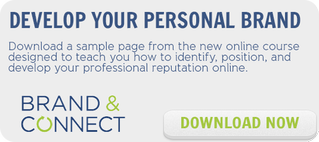 My friend Nancy mentioned recently that she was finding it difficult to source good candidates for a particular position she had open in her company. So she decided to ask her social network if they knew anyone who might be a good fit. (Here at The Center for Sales Strategy, we think asking your social network is a smart idea in most cases.)
My friend Nancy mentioned recently that she was finding it difficult to source good candidates for a particular position she had open in her company. So she decided to ask her social network if they knew anyone who might be a good fit. (Here at The Center for Sales Strategy, we think asking your social network is a smart idea in most cases.)
She posted a job description on Facebook, and within a week several people responded. One of the people who applied for the position was someone she met four years ago at a conference, but didn’t truly know. They had connected via Facebook, because that's what you do, and that’s how this candidate had learned about the opening—a perfect example of why using your social network is smart, not to mention cost-efficient.
Wanting to know more about this candidate, Nancy started right there—with her Facebook profile. And that’s where this person’s candidacy ended.
Be Careful How You Portray Yourself on Facebook
Nancy knew pretty quickly that she didn't want to work with this person, simply because of what she posted on Facebook. I asked her for some examples, and she told me she saw:
- Complaints: about the weather, her cat, her general state of health, you name it.
- Sad news: it seemed to Nancy that this candidate shared every piece of bad information she had.
- General grumpiness: her outlook on the world was gloomy.
I asked Nancy if she interviewed the acquaintance/candidate, even in spite of what she picked up so loud and clear on Facebook. “No,” she said, “what would be the point? Even if she had a lot of the technical qualifications I was looking for, she didn’t have a very important qualification. She was not someone I would enjoy dealing with on a daily basis, and the likelihood that we would have had a good working relationship was small. So I went on to other candidates.”
(Nancy may not have known it, but grumpiness or negativity is a measurable trait, and one that’s proven to be associated with lower productivity and effectiveness in a wide variety of positions. Put another way, the trait of positivity is shown to correlate with superior job performance in a great many roles.)
That candidate put her worst side on public display (does it get any more public than Facebook?!). She was probably portraying her real self; after all, how many people go out of their way to consistently display negativity when in truth they’re very positive? In doing so, she was declaring to the world that she’s not really a very desirable employee.
In today's increasingly connected world, you never know where your next job may come from. To your friends, your Facebook persona merges with the “you” they know to create the total you. To your more distant acquaintances, your Facebook persona is like an introduction. Nancy’s candidate had given herself an introduction that basically said she’s grumpy, sullen, and full of complaints about almost everything. Who would want to meet such a person if that’s how they were being described by someone who knew them?
You already know not to post semi-nude pics of yourself online because a future employer might find them. Expand that concept: Don’t post anything that portrays you in a bad light. It may come back to haunt you. Worse, you’ll never even know it because a prospective employer will read all about you and just never reach out to you.
Don’t be negative. Don’t brag about how you got away with something that wasn’t quite honest. Don’t rail against business if you’d like to work for a business. Don’t reveal that you’re beset with problems and have no solutions for most of them. Don’t mention that you stayed home from work claiming you were sick when you really weren’t. If you must do any of these things, go have coffee with a friend and share them quietly. Don’t broadcast them on Facebook where they may be seen by hundreds, maybe thousands, and where they’re archived forever.
Your next job may depend on how you portray yourself on Facebook and other social media.
If you need help defining your personal brand, consider our digital course about building your personal brand and connecting to key decision makers.



